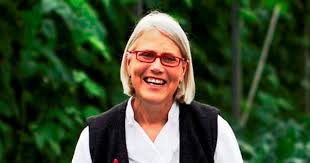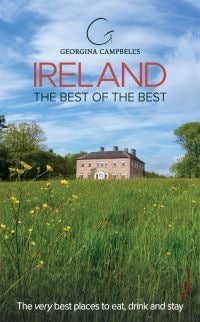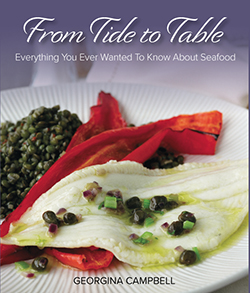The Darina Allen Column

This month Darina talks about Food as Medicine
A growing body of research confirms that our food should be our medicine. So making time to shop well and cook for ones family becomes an even greater priority at a time when so many people are stressed and stretched to the limit trying to keep more balls in the air than is even remotely possible. Something has to give but it mustn’t be nourishing wholesome food – too much depends on dinner…
Recent clinical research by Professors John Cyran and Ted Dinan has confirmed and highlighted the fundamental link between our gut biome and our physical and mental health. Turns out, that the lively community of bacteria, yeasts and viruses that can weigh up to1½ kilos influence our mood and behaviour far more than was originally acknowledged
According to their new book “The Psychobiotic Revolution”, gut inflammation has such a strong link to depression that we “ignore it at our peril”.
So how do we cultivate a healthy happy gut flora which has been christened the “second brain”? Eat real foods and mostly leafy green plants and root vegetables, fruit and whole-grains preferably organic. Fermented foods are also rich in probiotics, sauerkraut, kimchi, kefir, kombucha and real natural yoghurt, all stimulate the growth of beneficial bacteria.
Our gut biome thrives on a wide range of natural foods, it’s not rocket science. Lots of biodiversity fibre is also important. Highly processed foods “sugar up” our gut in every sense of the word and are now known to induce depression, possibly by boosting pathogenic bacteria.
There are other reasons to eliminate junk food from our diets. Emulsifiers frequently used in ice-cream and bought cakes have been shown to thin out our body’s protective layer of mucus which prevents pathogenic bacteria embedding themselves in the gut lining and thus protecting us from inflammatory diseases linked with depression.
Professors Cryan and Dinan are also convinced that breast milk, tailor made for baby, gives the best start and contains among many other things, oligosaccharides. These are complex sugars which are indigestible to the baby but are designed to help establish beneficial bacteria in the gut to boost the baby’s immune system and to reduce the risk of allergies in later life.
This subject concerns all of us. There was standing room only at the recent East Cork Slow Food event where Ted Dinan spoke about “Feeding melancholic microbes: how gut microbes influence our mood”.
The Psychobiotic Revolution co-authored by Scott C Anderson, John F. Cryan and Ted Dinan is available in all good book shops - and could just change your life.
RECIPES:
Ballymaloe Cookery School Homemade Yoghurt
Yoghurt can be made from fresh milk but it must be thoroughly boiled first, and allowed to cool to lukewarm before use. Boiling destroys unwanted bacteria in the milk, which could interfere with the bacterial action of the yoghurt bacillus.
We use organic ingredients where possible.
600ml (1 pint) fresh milk
2-3 teaspoons plain yoghurt
Heat the milk to 90°C (194°F) in a heavy bottomed saucepan. Allow to cool to 42°C (107.6°F). Stir in the yogurt. Leave in the saucepan or pour into a deep terracotta bowl, cover and put into a warm draught-free place until set.
This usually takes about 14 hours. The cooler the temperature, the longer the yogurt will take to set, but too high a temperature will kill the bacillus and the yogurt will not form (over 50°C/122°F).
Yoghurt can be set in a warm airing cupboard or boiler room, a vacuum flask with a wide neck or an insulated ice bucket (35-40°C/95-104°F is optimum temperature).
To keep the yoghurt warm, an earthenware pot with a lid, wrapped up in a warm blanket, put close to a radiator will also do the job. The simple aim is to provide steady even warmth to allow the bacillus to grow. Remember to keep back 2 tablespoons of your bowl of yoghurt as the starter for the next lot.
Yoghurt with Honey and Dates
unsweetened natural yoghurt, very cold
runny honey
best dates, fresh or dried
thick cream
almonds (shelled but with the inner brown skin left on i.e unblanched)
For each person half-fill a pudding bowl or glass with yoghurt.
Stone dates and chop them roughly. Put a few on the top of each helping of yogurt.
Spoon a good dollop of thick cream over the top, then trickle over 1 teasp. of runny honey.
If using the almonds, scatter a few more on now. (They may be used as well as, or instead of, the dates.)
Ayran
On a recent trip to Turkey I came across Ayran – a drinking yoghurt which is not only brilliantly healthy but becomes addictive. It’s almost a national drink in Turkey and is an excellent way to build up a healthy gut flora.
Simply dilute best quality natural yoghurt with cold iced water, approximately 1/3 water to yoghurt depending on quality and thickness of the original – should have a frothy top – best to whisk in the water.
Penny’s Fermented Jerusalem Artichokes
My daughter in law Penny Porteous-Allen is passionate about the importance of fermented food in our diet. She has developed many superb recipes of which this is one. Penny tells me it’s particularly delicious with lamb and redcurrant jelly. Use organic ingredients where possible.
Serves 8-12
900g Jerusalem artichokes
5 level teaspoons sea salt
1 medium red onion
1 garlic clove
1 teaspoon winter savoury, rosemary or thyme
a few wild garlic leaves
gorse flowers optional
250ml brine (made with 250ml filtered water and 1 level teaspoon sea salt (optional)
1 1.5 litre kilner jar, sterilised
Put the Jerusalem artichokes into a large mixing bowl. Add the sea salt and mix well. While you prepare the remaining ingredients, the salt will begin to draw moisture out of the artichokes.
Thinly slice the red onion; finely chop the garlic and herb of your choice. Roughly chop the wild garlic, then add all these to the Jerusalem artichokes and mix well.
Take handfuls of the mixture and pack it into a 1.5 litre sterilised Kilner jar, pushing down with your fist every time.
Once all the vegetables are in the jar, push down again. You want the liquid (brine) to come up and over the mixture; I usually find a jam jar that fits snugly inside the bigger jar to use as a weight on top of the vegetables to keep them submerged. If needs be, add some or all of the extra brine.
Successful fermentation takes place if all the ingredients are submerged under the liquid. Leave on a work surface to ferment for 10 days. The resulting taste should be deliciously sweet, sour and savoury with great crunch.
---
NB Fermentation Workshop with Penny Allen on Thursday 15th March at Ballymaloe Cookery School.
Learn how to make Sauerkraut, Kombucha and water Kefir. You will leave with a jar of your very own sauerkraut and starter cultures for Kombucha and Kefir. www.cookingisfun.ie or 0214646785
Bee Keeping for beginners with Shane Lehane. Wednesday 14th March 2018 at 2.30pm www.cookingisfun.ie or 0214646785
Don’t miss this course, even if you haven’t the slightest interest in bee-keeping Shane Lehane’s enthusiasm will spark your curiosity and show how both urban and rural dwellers can have a bee hive and produce their own beautiful nutrient dense honey.
This surprisingly comprehensive course offers a highly informative and entertaining insight into the vernacular craft of beekeeping and the production of quality honey.
It is ideally suited for anyone who has an interest in good food, nature, traditional craft, and who has a positive approach to healthy and positive living. Delivered with verve and imagination by Shane Lehane, incorporates an interactive talk supported by a stimulating slideshow.
Shane will also introduce the practical side of beekeeping and participants will have a chance to learn about the beekeeping equipment, bee-suits, beehives, smokers and the full spectrum of bee -keeping paraphernalia.
In addition, there will be a chance to taste different honeys and bee pollen, while participants will be able to appreciate the properties of beeswax and lesser-known bee products such as propolis.
---
'30 Years at Ballymaloe' - Bord Gáis Avonmore Cookbook of the Year 2013
Good Food Ireland Cookery School of the Year 2012/2013
***
 Once again, the Ballymaloe Cookery School in East Cork has a great programme of cookery courses for all interests and abilities running throughout 2018. Ranging from a relaxing visit to sit in on an afternoon cookery demonstration to a week long ‘Intensive Introductory Course’.
Once again, the Ballymaloe Cookery School in East Cork has a great programme of cookery courses for all interests and abilities running throughout 2018. Ranging from a relaxing visit to sit in on an afternoon cookery demonstration to a week long ‘Intensive Introductory Course’.
Sitting in the middle of a 100 acre organic farm the Ballymaloe Cookery School provides its students not only with a life skill learnt under the expert tutelage of their very capable teachers but also a place to relax and unwind from the stresses and strains of normal everyday life. The cottage accommodation available onsite for residential courses consists of a collection of delightful converted outbuildings which have been transformed over the years by the Allens, and other accommodation is available locally for the short courses.
www.cookingisfun.ie






There are currently no comments
Leave a comment
Not a member? Register for your free membership now!
Or leave a comment by logging in with: